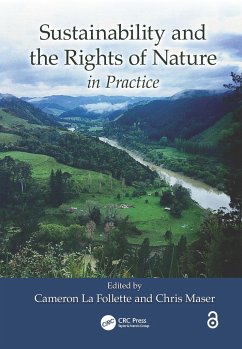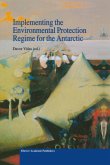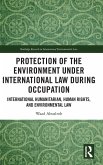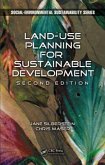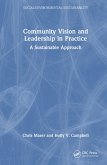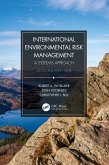Sustainability and the Rights of Nature in Practice
Herausgeber: La Follette, Cameron; Maser, Chris
Sustainability and the Rights of Nature in Practice
Herausgeber: La Follette, Cameron; Maser, Chris
- Gebundenes Buch
- Merkliste
- Auf die Merkliste
- Bewerten Bewerten
- Teilen
- Produkt teilen
- Produkterinnerung
- Produkterinnerung
This book elucidates and examines how the Rights of Nature paradigm is being enacted in law, and brought to bear in real situations around the world to create sustainability for all life. Written by scholars and policymakers, it discusses the challenges and opportunities in shifting structures of governance to an ecological-law based paradigm.
Andere Kunden interessierten sich auch für
![Implementing the Environmental Protection Regime for the Antarctic Implementing the Environmental Protection Regime for the Antarctic]() D. Vidas (Hrsg.)Implementing the Environmental Protection Regime for the Antarctic121,99 €
D. Vidas (Hrsg.)Implementing the Environmental Protection Regime for the Antarctic121,99 €![Decision-Making for a Sustainable Environment Decision-Making for a Sustainable Environment]() Chris MaserDecision-Making for a Sustainable Environment132,99 €
Chris MaserDecision-Making for a Sustainable Environment132,99 €![Space Debris Peril Space Debris Peril]() Space Debris Peril174,99 €
Space Debris Peril174,99 €![Protection of the Environment Under International Law During Occupation Protection of the Environment Under International Law During Occupation]() Waad AbualrobProtection of the Environment Under International Law During Occupation198,99 €
Waad AbualrobProtection of the Environment Under International Law During Occupation198,99 €![Land-Use Planning for Sustainable Development Land-Use Planning for Sustainable Development]() Jane Silberstein M aLand-Use Planning for Sustainable Development153,99 €
Jane Silberstein M aLand-Use Planning for Sustainable Development153,99 €![Community Vision and Leadership in Practice Community Vision and Leadership in Practice]() Chris MaserCommunity Vision and Leadership in Practice127,99 €
Chris MaserCommunity Vision and Leadership in Practice127,99 €![International Environmental Risk Management International Environmental Risk Management]() Robert A WoellnerInternational Environmental Risk Management165,99 €
Robert A WoellnerInternational Environmental Risk Management165,99 €-
-
-
This book elucidates and examines how the Rights of Nature paradigm is being enacted in law, and brought to bear in real situations around the world to create sustainability for all life. Written by scholars and policymakers, it discusses the challenges and opportunities in shifting structures of governance to an ecological-law based paradigm.
Hinweis: Dieser Artikel kann nur an eine deutsche Lieferadresse ausgeliefert werden.
Hinweis: Dieser Artikel kann nur an eine deutsche Lieferadresse ausgeliefert werden.
Produktdetails
- Produktdetails
- Verlag: CRC Press
- Seitenzahl: 436
- Erscheinungstermin: 24. Oktober 2019
- Englisch
- Abmessung: 257mm x 183mm x 30mm
- Gewicht: 726g
- ISBN-13: 9781138584518
- ISBN-10: 1138584517
- Artikelnr.: 57998722
- Herstellerkennzeichnung
- Libri GmbH
- Europaallee 1
- 36244 Bad Hersfeld
- gpsr@libri.de
- Verlag: CRC Press
- Seitenzahl: 436
- Erscheinungstermin: 24. Oktober 2019
- Englisch
- Abmessung: 257mm x 183mm x 30mm
- Gewicht: 726g
- ISBN-13: 9781138584518
- ISBN-10: 1138584517
- Artikelnr.: 57998722
- Herstellerkennzeichnung
- Libri GmbH
- Europaallee 1
- 36244 Bad Hersfeld
- gpsr@libri.de
Cameron La Follette has a law degree from Columbia University School of Law, a Masters in Psychology from New York University, and a Bachelor's in Journalism from the University of Oregon. Her initial environmental activism (1978-1982) was with Oregon nonprofit organizations that focused on preserving ancient forests on Federal public lands managed by the U.S. Forest Service and U.S. Bureau of Land Management to protect salmon habitat, clean drinking water, and forest ecosystems. She served on the Salem, OR, Planning Commission for three years (2002-05) applying the City of Salem's land use and zoning ordinances to many situations ranging from residential housing to industrial and commercial properties. Since 2010, she has been Executive Director of an environmental and land use nonprofit that focuses on protecting the natural resources of the Oregon coast, working with residents to oppose ill-advised land use projects, and helping maintain livable coastal communities. She is the co-author, with Chris Maser, of Sustainability and the Rights of Nature: An Introduction, published by CRC Press in 2017. She was the lead author on "Oregon's Manila Galleon," a special issue of Oregon Historical Quarterly published in June 2018, and has also written several articles on Oregon coastal history for the online Oregon Encyclopedia. Chris Maser spent over 25 years as a research scientist in natural history and ecology in forest, shrub steppe, subarctic, desert, coastal, and agricultural settings. Trained primarily as a vertebrate zoologist, he was a research mammalogist in Nubia, Egypt, (1963-1964) with the Yale University Peabody Museum Prehistoric Expedition and a research mammalogist in Nepal (1966-1967), where he participated in a study of tick-borne diseases for the U.S. Naval Medical Research Unit #3 based in Cairo, Egypt. He conducted a three-year (1970-1973) ecological survey of the Oregon Coast for the University of Puget Sound, Tacoma, Washington. He was a research ecologist with the U.S. Bureau of Land Management for thirteen years--the first seven (1974-1981) studying the biophysical relationships in rangelands in southeastern Oregon and the last six (1982-1987) studying old-growth forests in western Oregon. He also spent a year as a landscape ecologist with the U.S. Environmental Protection Agency (1990-1991). He is an independent author as well as an international lecturer, facilitator in resolving environmental conflicts, vision statements, and sustainable community development. He is also an international consultant in forest ecology and sustainable forestry practices. He has written or edited over 290 publications, including 43 books.
Introduction: What Rights of Nature Is and What It Must Include. Rights of
Nature: Acting Towards Land in a Sacred Manner. Small Scale Paradigm
Changes Add to the Rights of Nature Mosaic. Definitions of Difficult Terms.
Philosophical and Legal Considerations. Human Rights to a Sustainable
Environment Is Not Enough. Ecological Law, Governance and Ethics.
Restoration is Not Rights of Nature - Unless It Is Systemic. Rights of
Nature in Practice: Examples and Beginnings. The Whanganui River,
Personhood and New Zealand Leadership. Ecuador and Bolivia: Problems on the
Ground. The Ganges Watershed and Legal Personhood. Sustainable Nations,
Rights of Nature in Practice if Not Law. Nepal: Case Law and Changes.
Bhutan: A Sustainable Kingdom. Belize: A Nature-Based Economy. Rights of
Nature in Practice: Challenges and Opportunities. The Problem and Promise
of American Communities and Rights of Nature. Indigenous Cultivation,
Native Lands and Rights of Nature: A Network of Regional Opportunities.
Rights of Nature in Practice: Energy and Infrastructure. Road Maps for the
Switch to Small Scale Solar. Removing Elwha Dam, Other Dams and Energy
Infrastructure. The Rights of Nature Mosaic. Permaculture & Organic
Farming. Caledonian Forest of Scotland: Large Scale Landscape Restoration
Focusing on Nature's Requirements. Grasslands, Agriculture and Cattle:
Maintaining Nature's Rights. Wild Caught Foods, Especially Ocean Foods, and
Rights of Nature. Creating and Enforcing Rights of Nature Around the World
. Leadership and Respect for Life in Southeast Asia. International Trade
Changes for Sustainability. Conclusion.
Nature: Acting Towards Land in a Sacred Manner. Small Scale Paradigm
Changes Add to the Rights of Nature Mosaic. Definitions of Difficult Terms.
Philosophical and Legal Considerations. Human Rights to a Sustainable
Environment Is Not Enough. Ecological Law, Governance and Ethics.
Restoration is Not Rights of Nature - Unless It Is Systemic. Rights of
Nature in Practice: Examples and Beginnings. The Whanganui River,
Personhood and New Zealand Leadership. Ecuador and Bolivia: Problems on the
Ground. The Ganges Watershed and Legal Personhood. Sustainable Nations,
Rights of Nature in Practice if Not Law. Nepal: Case Law and Changes.
Bhutan: A Sustainable Kingdom. Belize: A Nature-Based Economy. Rights of
Nature in Practice: Challenges and Opportunities. The Problem and Promise
of American Communities and Rights of Nature. Indigenous Cultivation,
Native Lands and Rights of Nature: A Network of Regional Opportunities.
Rights of Nature in Practice: Energy and Infrastructure. Road Maps for the
Switch to Small Scale Solar. Removing Elwha Dam, Other Dams and Energy
Infrastructure. The Rights of Nature Mosaic. Permaculture & Organic
Farming. Caledonian Forest of Scotland: Large Scale Landscape Restoration
Focusing on Nature's Requirements. Grasslands, Agriculture and Cattle:
Maintaining Nature's Rights. Wild Caught Foods, Especially Ocean Foods, and
Rights of Nature. Creating and Enforcing Rights of Nature Around the World
. Leadership and Respect for Life in Southeast Asia. International Trade
Changes for Sustainability. Conclusion.
Introduction: What Rights of Nature Is and What It Must Include. Rights of
Nature: Acting Towards Land in a Sacred Manner. Small Scale Paradigm
Changes Add to the Rights of Nature Mosaic. Definitions of Difficult Terms.
Philosophical and Legal Considerations. Human Rights to a Sustainable
Environment Is Not Enough. Ecological Law, Governance and Ethics.
Restoration is Not Rights of Nature - Unless It Is Systemic. Rights of
Nature in Practice: Examples and Beginnings. The Whanganui River,
Personhood and New Zealand Leadership. Ecuador and Bolivia: Problems on the
Ground. The Ganges Watershed and Legal Personhood. Sustainable Nations,
Rights of Nature in Practice if Not Law. Nepal: Case Law and Changes.
Bhutan: A Sustainable Kingdom. Belize: A Nature-Based Economy. Rights of
Nature in Practice: Challenges and Opportunities. The Problem and Promise
of American Communities and Rights of Nature. Indigenous Cultivation,
Native Lands and Rights of Nature: A Network of Regional Opportunities.
Rights of Nature in Practice: Energy and Infrastructure. Road Maps for the
Switch to Small Scale Solar. Removing Elwha Dam, Other Dams and Energy
Infrastructure. The Rights of Nature Mosaic. Permaculture & Organic
Farming. Caledonian Forest of Scotland: Large Scale Landscape Restoration
Focusing on Nature's Requirements. Grasslands, Agriculture and Cattle:
Maintaining Nature's Rights. Wild Caught Foods, Especially Ocean Foods, and
Rights of Nature. Creating and Enforcing Rights of Nature Around the World
. Leadership and Respect for Life in Southeast Asia. International Trade
Changes for Sustainability. Conclusion.
Nature: Acting Towards Land in a Sacred Manner. Small Scale Paradigm
Changes Add to the Rights of Nature Mosaic. Definitions of Difficult Terms.
Philosophical and Legal Considerations. Human Rights to a Sustainable
Environment Is Not Enough. Ecological Law, Governance and Ethics.
Restoration is Not Rights of Nature - Unless It Is Systemic. Rights of
Nature in Practice: Examples and Beginnings. The Whanganui River,
Personhood and New Zealand Leadership. Ecuador and Bolivia: Problems on the
Ground. The Ganges Watershed and Legal Personhood. Sustainable Nations,
Rights of Nature in Practice if Not Law. Nepal: Case Law and Changes.
Bhutan: A Sustainable Kingdom. Belize: A Nature-Based Economy. Rights of
Nature in Practice: Challenges and Opportunities. The Problem and Promise
of American Communities and Rights of Nature. Indigenous Cultivation,
Native Lands and Rights of Nature: A Network of Regional Opportunities.
Rights of Nature in Practice: Energy and Infrastructure. Road Maps for the
Switch to Small Scale Solar. Removing Elwha Dam, Other Dams and Energy
Infrastructure. The Rights of Nature Mosaic. Permaculture & Organic
Farming. Caledonian Forest of Scotland: Large Scale Landscape Restoration
Focusing on Nature's Requirements. Grasslands, Agriculture and Cattle:
Maintaining Nature's Rights. Wild Caught Foods, Especially Ocean Foods, and
Rights of Nature. Creating and Enforcing Rights of Nature Around the World
. Leadership and Respect for Life in Southeast Asia. International Trade
Changes for Sustainability. Conclusion.

